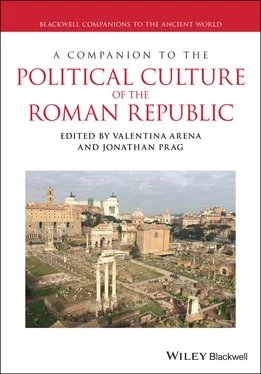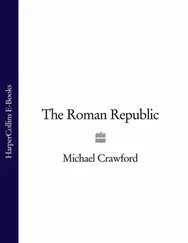Nathan Rosensteinis Professor Emeritus in the Department of History at The Ohio State University. His research focuses on the intersection of political culture and the Republican military and on the economic and demographic aspects of Roman warfare. He is the author or co-editor of several books, most recently Rome and the Mediterranean 290 – 146 BC: The Imperial Republic (Edinburgh 2012). He is currently co-editor of The Oxford History of the Roman World .
Jörg Rüpkeis Fellow for Religious Studies at the Max Weber Center for Advanced Cultural and Social Studies of the University of Erfurt, Germany and its Vice-Director. He has authored several books on Roman religion, priesthood and the history of the calendar, including Pantheon (2018) and On Roman Religion (2016, 2nd ed. 2019) and has edited the Blackwell Companions to Roman Religion (2nd ed. 2011) and, together with Rubina Raja, the Archaeology of Religion in the Ancient World (2015, 2nd ed. 2020).
Amy Russellis Associate Professor of Classics at Brown University. She is the author of The Politics of Public Space in Republican Rome (Cambridge 2016), and has also published on the tribunes of the plebs , Polybius and the city of Rome through the ages. Her latest research concerns the Senate of the imperial period.
Eran Shalevis Associate Professor of History at the University of Haifa, Israel. He is the author of two books, Rome Reborn on Western Shores: Historical Imagination and the Creation of the American Republic (University of Virginia Press 2009) and American Zion: The Old Testament as a Political Text from the Revolution to the Civil War (Yale University Press 2012). He is currently writing a book provisionally titled The Star Spangled Republic: Political Astronomy and the New American Constellation .
Catherine Steelis Professor of Classics at the University of Glasgow. Her research interests include Republican oratory, including Cicero’s, and the political history of the late Roman Republic. She is the author of The End of the Roman Republic, 146–44 BC: Conquest and Crisis (Edinburgh University Press 2013), and the editor of The Cambridge Companion to Cicero (Cambridge University Press 2013); she is co-editor of Reading Republican Oratory: Reconstructions, Contexts, Receptions (Oxford University Press 2018) and Institutions and Ideology in Republican Rome: Speech, Audience and Decision (Cambridge University Press 2018).
W. Jeffrey Tatumis Professor of Classics at the Victoria University of Wellington (New Zealand). His interests focus on the history and literature of the Roman Republic. He is the author or editor of several books, including The Patrician Tribune: Publius Clodius Pulcher (1999), Always I am Caesar (2008), Plutarch: The Rise of Rome , with Chris Pelling (2013), Athens to Aotearoa: Greece and Rome in New Zealand Literature and Society , with Diana Burton and Simon Perris (2017), and Quintus Cicero: A Brief Handbook on Canvassing for Office (2018). He is currently working on a biography of Mark Antony and, with Laurel Fulkerson, a history of republican literature.
Jerry Toneris Fellow and Director of Studies in Classics at Churchill College, Cambridge. He is author of Popular Culture in Ancient Rome (2009) and Leisure and Ancient Rome (1995) as well as various articles on aspects of non-elite life in ancient Rome.
Uwe Walterhas been Professor of Ancient History at Bielefeld University since 2004. His Roman studies include Die Frühen Römischen Historiker (FRH) , 2 vols. (text, trans., commentary, with Hans Beck, 2001/2004) and Memoria und res publica: Zur Geschichtskultur im republikanischen Rom (2004), as well as several papers, most recently ‘Mehr als Mythos und Konstruktion? Die römische Königszeit’ ( Historische Zeitschrift 302, 2016). His overview of the political order of the Roman Republic ( Politische Ordnung in der römischen Republik (Enzyklopädie der griechisch-römischen Antike, 6), Berlin), appeared in 2017.
Alexander Yakobsonis Associate Professor of Ancient History, Hebrew University. His main fields of research are democracy, popular politics, public opinion and elections in the ancient world, the political culture of the Roman Republic and early Principate and the status of the imperial family. In addition to numerous papers, he is the author of Elections and Electioneering in Rome: A Study in the Political System of the Late Republic (Stuttgart 1999). Research other than ancient history includes the topics of democracy, national identity, nation-state and the rights of national minorities, religion and state in Israel and in Western democracies.
| CIL |
1862– . Corpus Inscriptionum Latinarum . Berlin. |
| ILS |
Dessau, H. 1892-1916. Inscriptiones Latinae Selectae . Berlin. |
| FRHist |
Cornell, T.J. ed. 2013. The Fragments of the Roman Historians, 3 vols . Oxford. |
| IG |
1873– . Inscriptiones Graecae consilio et auctoritate Academiae Scientiarum Berolinensis et Brandenburgensis editae . Berlin. |
| ILLRP |
Degrassi, A. 1965. Inscriptiones Latinae Liberae Rei Publicae. 2nd ed . Florence. |
| LTUR |
Steinby, E. M., ed. 1993–2001. Lexicon Topographicum Urbis Romae . Rome. |
| RE |
1890–1980. Realencyclopädie der classischen Altertumswissenschaft . Stuttgart. |
| Syll . 3 |
Dittenberger, W. 1915–1924. Sylloge inscriptionum graecarum . 3rd ed. Leipzig. |
References to ancient authors and their works follow the style of the Oxford Classical Dictionary (4th edition, Oxford, 2012).
Abbreviations of classical journals follow the style of L’Année philologique (Paris, 1912–).
Valentina Arena and Jonathan Prag
The decision to dedicate an entire volume to the study of the political culture of the Roman Republic reflects what is currently the most comprehensive approach to the subject traditionally labelled as Roman Republican politics (for a definition of the concept of ‘political culture’ and its history in the field of Roman studies, see Chapter 1). This volume analyses the Roman political world through the wider lenses of ‘Roman political culture’, in full recognition that, alongside the working of the political and religious institutions and their related officers, a system of shared values, traditions and communicative strategies played a fundamental role in the social and political life of Rome throughout the Republic
The subject has been at the centre of an intensely contested debate for centuries and Part I (supplemented by Chapter 1) traces the modern history of this. Needless to say, the subject goes right back to contemporary discourse, beginning for us with Polybius, whose account perhaps already foreshadows some of the wider approaches now being advocated – and it is to the ancient accounts that Part II is dedicated. More recently, modern historians have broadly approached the study of the Republican political life of Rome following three main strands: first, the study of its legal system, its institutions and rules and regulations; second, the investigation of the social interactions amongst the members of the elite (which, under the impetus of neo-Marxist approaches of the later twentieth century, extended to a growing interest in their interactions with the wider Roman people and the latter’s socioeconomic demands); and finally, the analysis of the ‘political grammar’, as Meier (1980 [1966]) called it, which put an emphasis on shared beliefs, values, myths, traditions and symbolic communication of the political system. Each of these approaches has yielded important results, which, however, taken separately, provide a somewhat fragmented view of Roman political world.
Читать дальше












